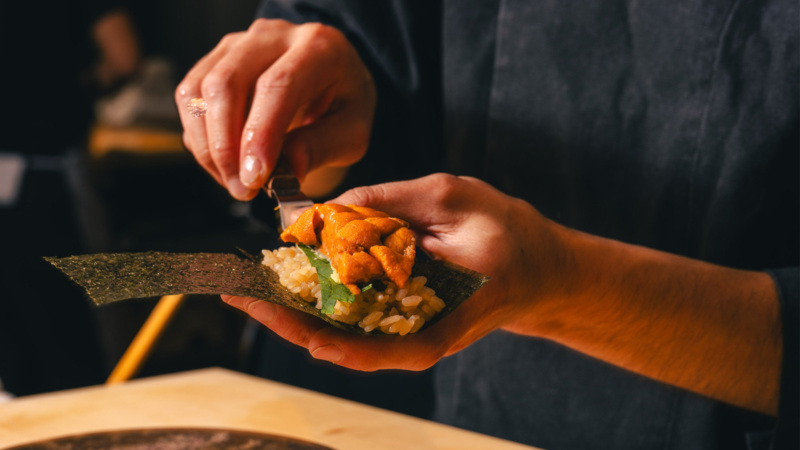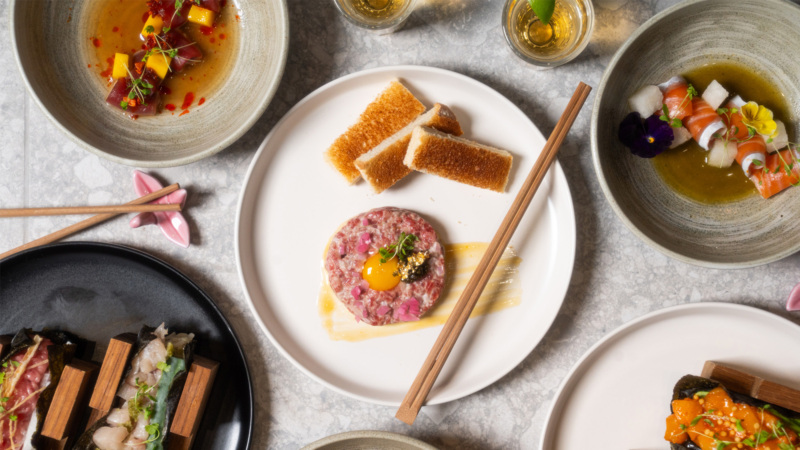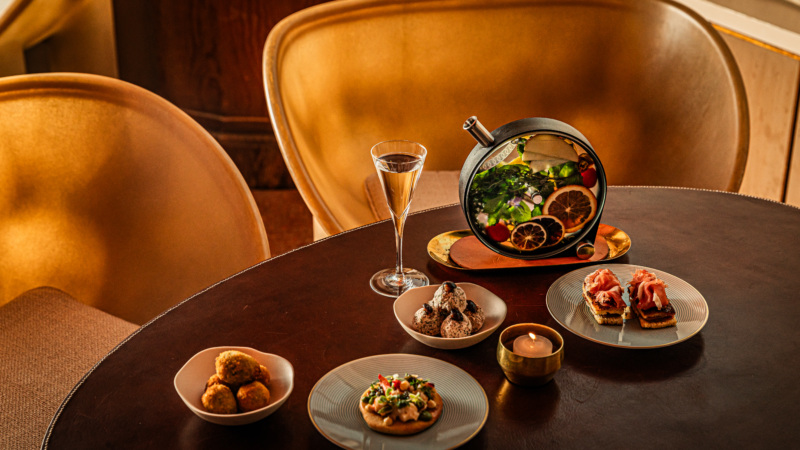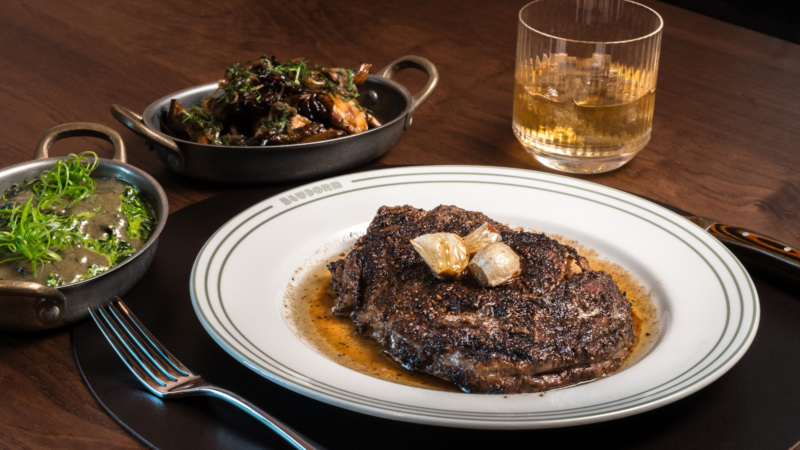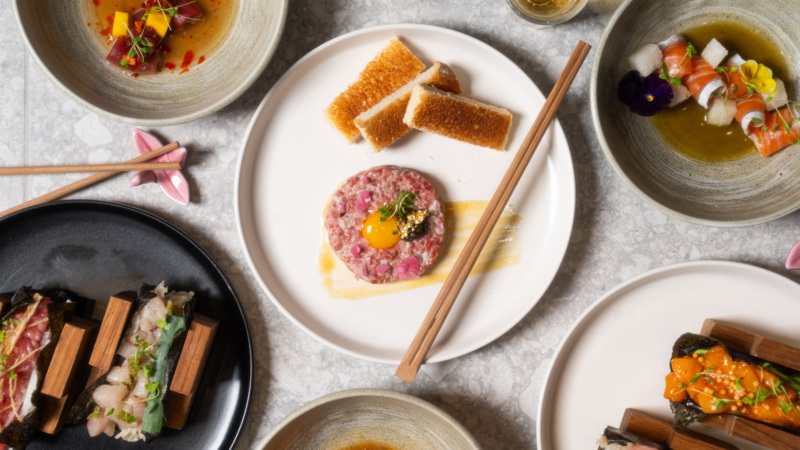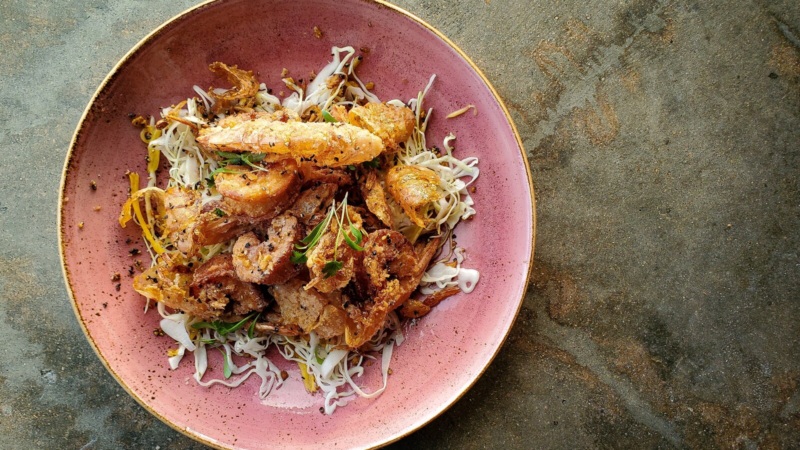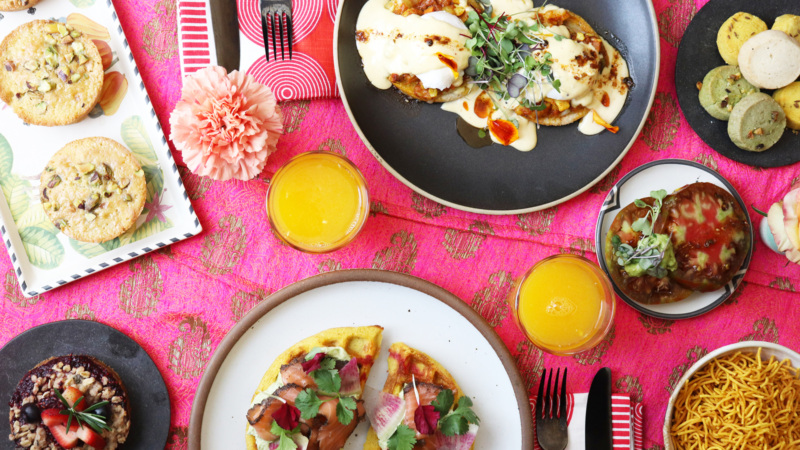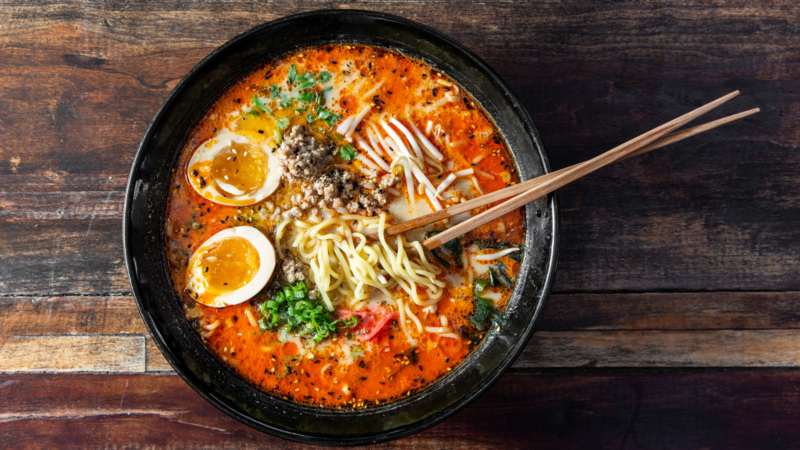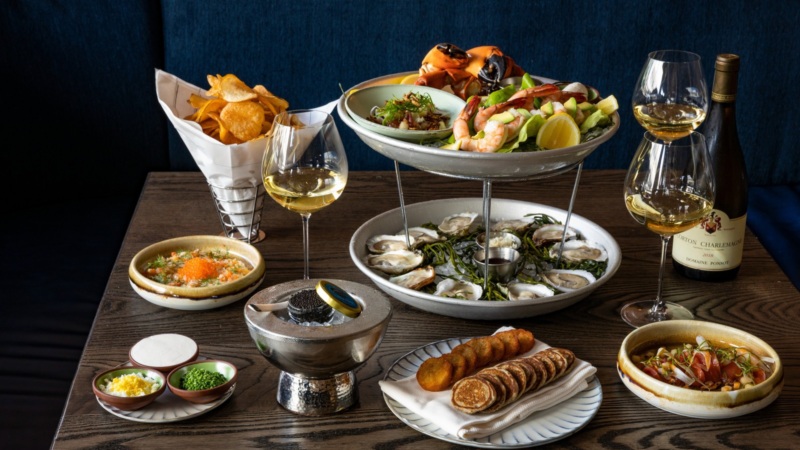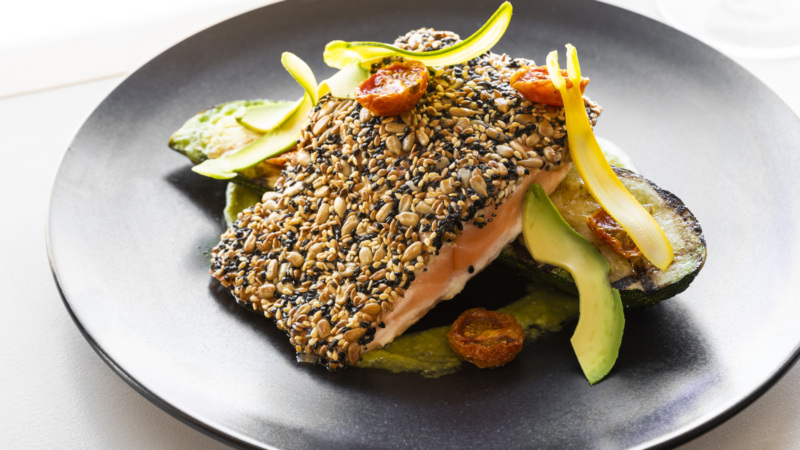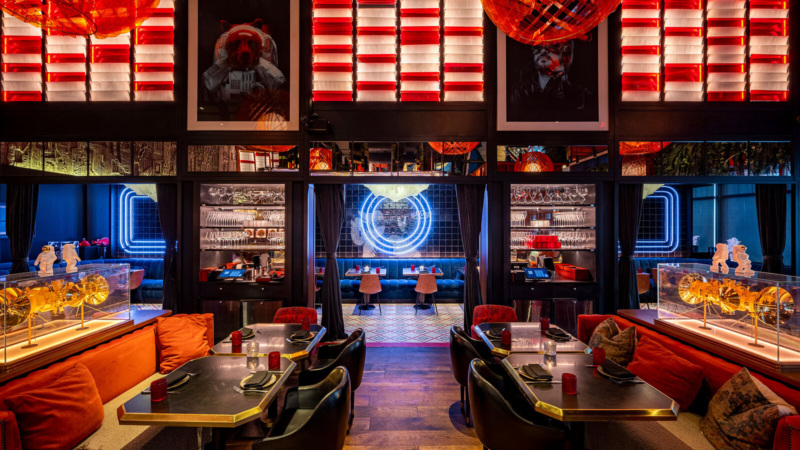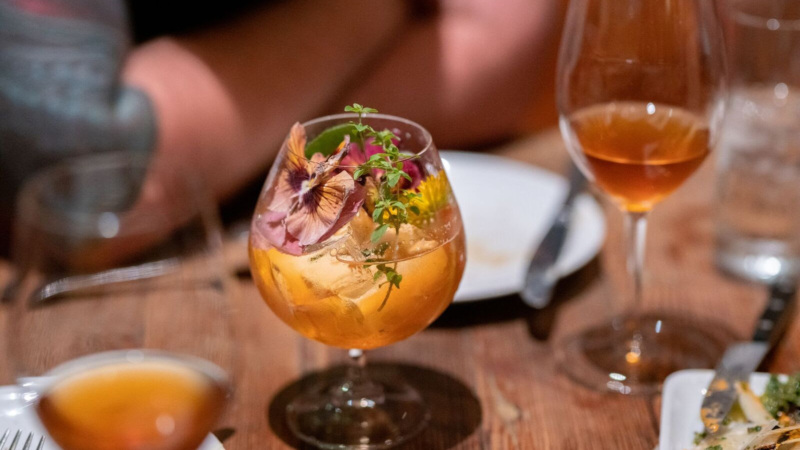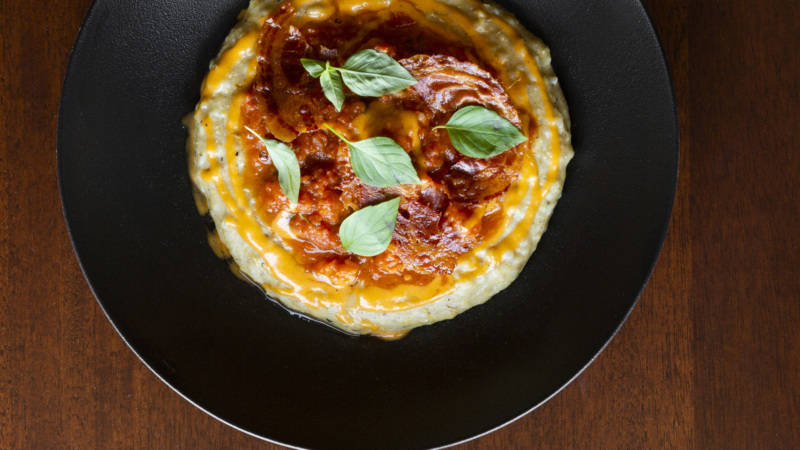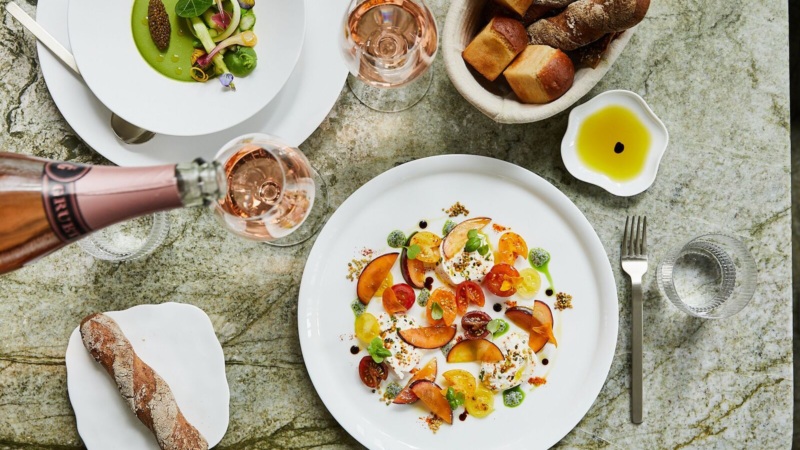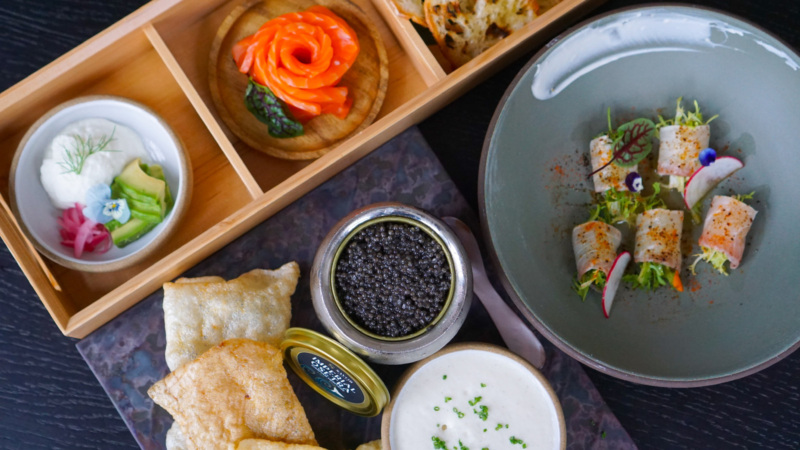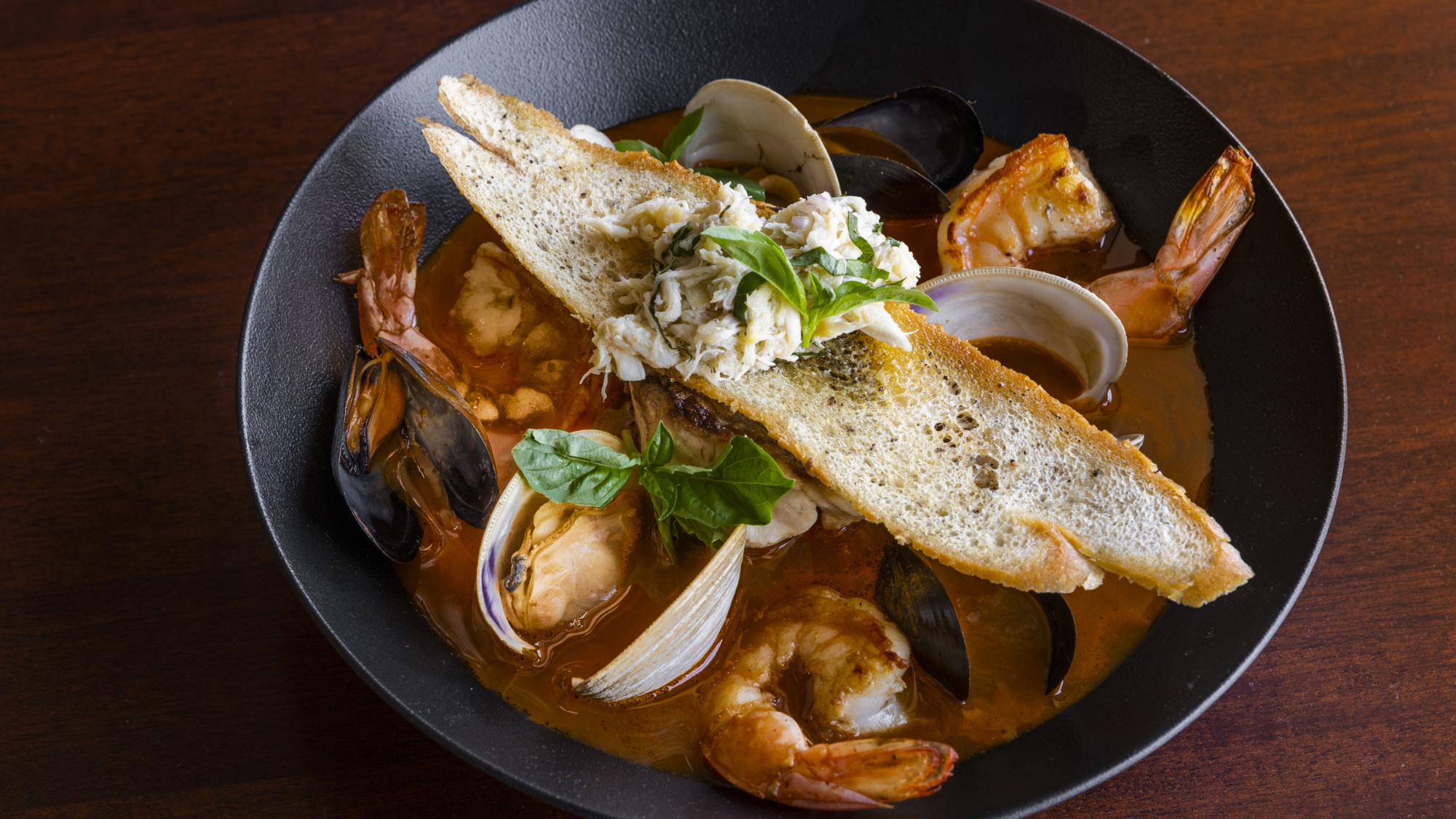
At Bludorn, the Mission Is to Reveal the Beauty of Gulf Coast Cooking
Launching a brand-new restaurant in a brand-new city in the midst of a global pandemic probably wasn’t on chef and restaurateur Aaron Bludorn’s bingo card. Nevertheless, he forged ahead in 2020, remaking the Montrose building once occupied by Seth Siegel-Gardner and Terrence Gallivan’s acclaimed The Pass & Provisions into his eponymous restaurant, a gem serving New American, French-inspired fare that can be described as fine dining — but without the typical white tablecloth fussiness, and with a strong neighborhood pull.
Four years later, not only has Bludorn survived — the pandemic, a freeze, a derecho, and most recently, Hurricane Beryl — but the James Beard-nominated restaurant has also thrived, finding favor not only from national critics but also, crucially, the everyday diners who keep Houston’s restaurant community afloat. The praise and patronage paved the way for the chef, his wife Victoria Bludorn (whose maiden name, Pappas, is well-known among Houstonians), and their partner and friend Cherif Mbodji, to open two more restaurants — Rice Village seafood haven Navy Blue and Memorial’s casual tavern Bar Bludorn. A fourth, Perseid, located in Montrose’s forthcoming Hotel Saint Augustine from Austin-based hospitality group Bunkhouse, debuts this fall.
While each restaurant possesses its own distinct style and vibe, they all share two things in common: outstanding hospitality and food that thoughtfully incorporates seasonal ingredients and the bounty of the Texas Gulf Coast. Perseid, named for the famous meteor shower that lights up the sky every year from mid-July to late August, will follow suit, serving French-leaning cuisine with a Gulf Coast touch.
“I’m a Houstonian now … this is where we put our roots down, and we want to embrace what is around us,” Bludorn says, explaining the significance of nodding to the Gulf Coast in his menus. “It helps you understand the local palate.”
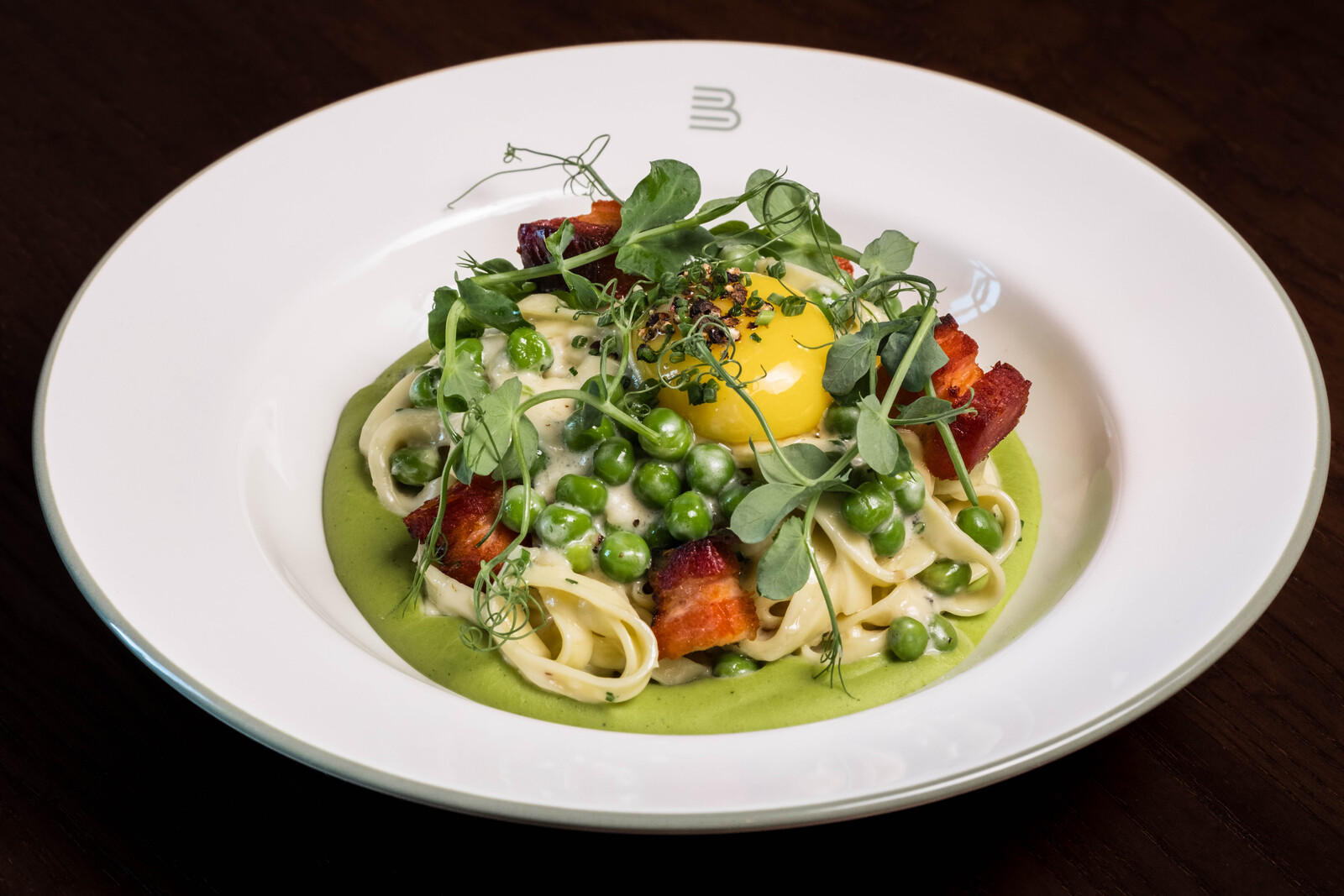
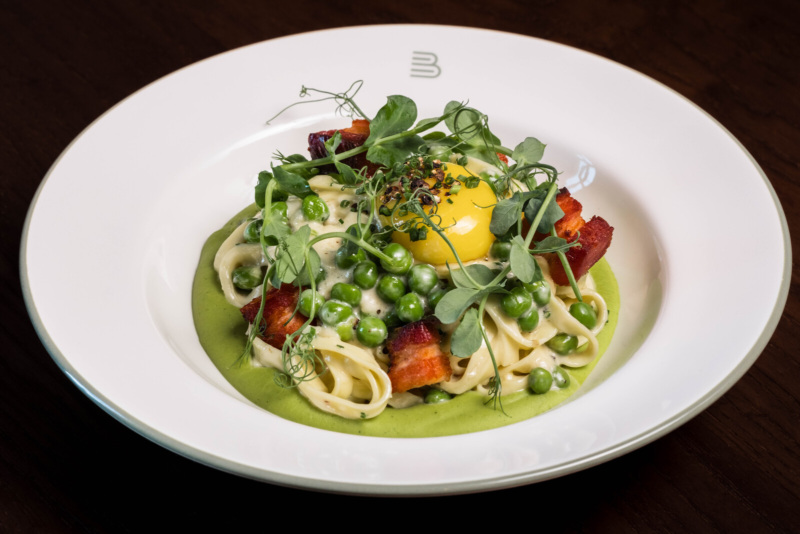
Bludorn, who was born in Minneapolis and raised in the Pacific Northwest, began his professional career with a degree in culinary arts from the Culinary Institute of America. His résumé includes stints at such fine dining establishments as Seattle’s Canlis and Sonoma’s Cyrus, working under revered chef Douglas Keane. And before moving to Houston, the chef spent a decade at world-renowned chef Daniel Boulud’s Café Boulud in New York City, rising from chef de partie to executive chef in 2014. It was during his time at Café Boulud that he met Victoria — who worked in operations at Boulud’s Dinex Group — and Senegal-born Mbodji, who served as the general manager of Café Boulud before working as service director at Restaurant Daniel.
Starting fresh in Houston, one of the country’s most diverse cities, was an easy decision for Bludorn. “There’s an incredible restaurant community, incredible chef community, incredible community of diners that are excited about what’s going on here,” he says. “Everyone is rooting you on and is driving you to be better every day. We just feel like we’re one little cog in the massive machine that has become this dining scene.”
For Victoria, who runs marketing and HR for the Bludorn Restaurant Group, settling back down in her hometown after being away for 12 years has been “exciting and unexpected,” she said. In late July, she and Aaron welcomed a daughter — a new baby sister for their two young sons. “I’m very fortunate to live around so much family and so many friends, and Aaron and Cherif have just seamlessly plugged in,” she says of coming home. “I was rediscovering the city as well in a totally different way, with Aaron. It’s like I was being reintroduced.”
Meanwhile, Mbodji — Bludorn’s director of operations — visited Houston for the first time in 2018, for Aaron and Victoria’s wedding. He recalls being surprised by the city in a “very pleasant way,” he says. “I saw in Houston a place where I really felt like I was at home, a place where I could raise my kids. I always talk about the Houston Rodeo … You take a look around and there are thousands of people, but you really see a highly diverse city. It’s just a beautiful hybrid mix of people, and it reflects on all aspects of life, including the food.”
To be sure, Houstonians couldn’t be more pleased to have the three current restaurants, and soon Perseid, among the city’s most buzzed-about dining destinations. As the team continues to expand their growing empire, we spoke to them about why Space City’s food scene deserves to be celebrated, the importance of mentoring talent from within, weathering unpredictable challenges, and what’s next.
This interview has been edited for length and clarity.
Bludorn, Navy Blue, and Bar Bludorn all lost power during Hurricane Beryl, with Bludorn the last to reopen. How are the restaurants doing?
Aaron Bludorn: It has been a slow ramp up to get back, I think mostly because Houstonians are also dealing with their own issues. It was a really tough week and a half — that’s crazy to say. But we’re seeing people come back and it feels almost a little bit like post-COVID, or definitely a post-freeze feel. Our staff is very resilient and excited to be back. In some ways, there’s always silver linings. We got to completely clean and restart Bludorn. The other restaurants, too, to a certain degree.
This being Houston, it won’t be the last weather event to strike. How do you prepare for the next one?
Cherif Mbodji: It’s an ongoing conversation. If you live in this area of the country, you certainly have to adapt and be ready to react when bad weather happens. It’s part of life. I think every hurricane that we’ve experienced as a business has taught us some new things, and that just makes us better at responding.
Bludorn: Making sure that we have postmortems, where we all talk about what worked well, what didn’t work well, and making sure we put that on paper so we can have a discussion with the team about the game plan next time. We tried to set up a generator at Bludorn and failed miserably. But we learned a lot. It burned out a lot of our equipment because it was faulty, and we hired some electricians that probably weren’t the best. We were pretty hasty to try to just do whatever it takes, and sometimes you need to pause for a second and think, “Is this the right thing to do?”
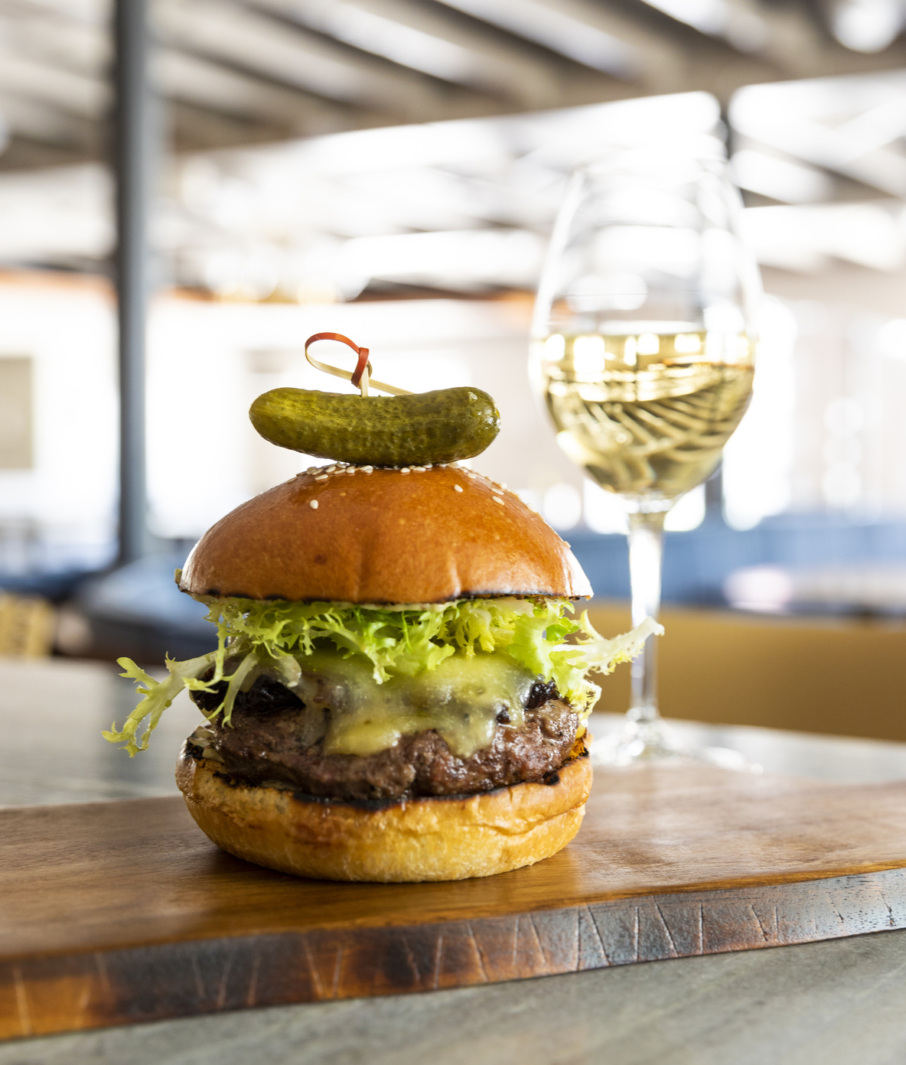
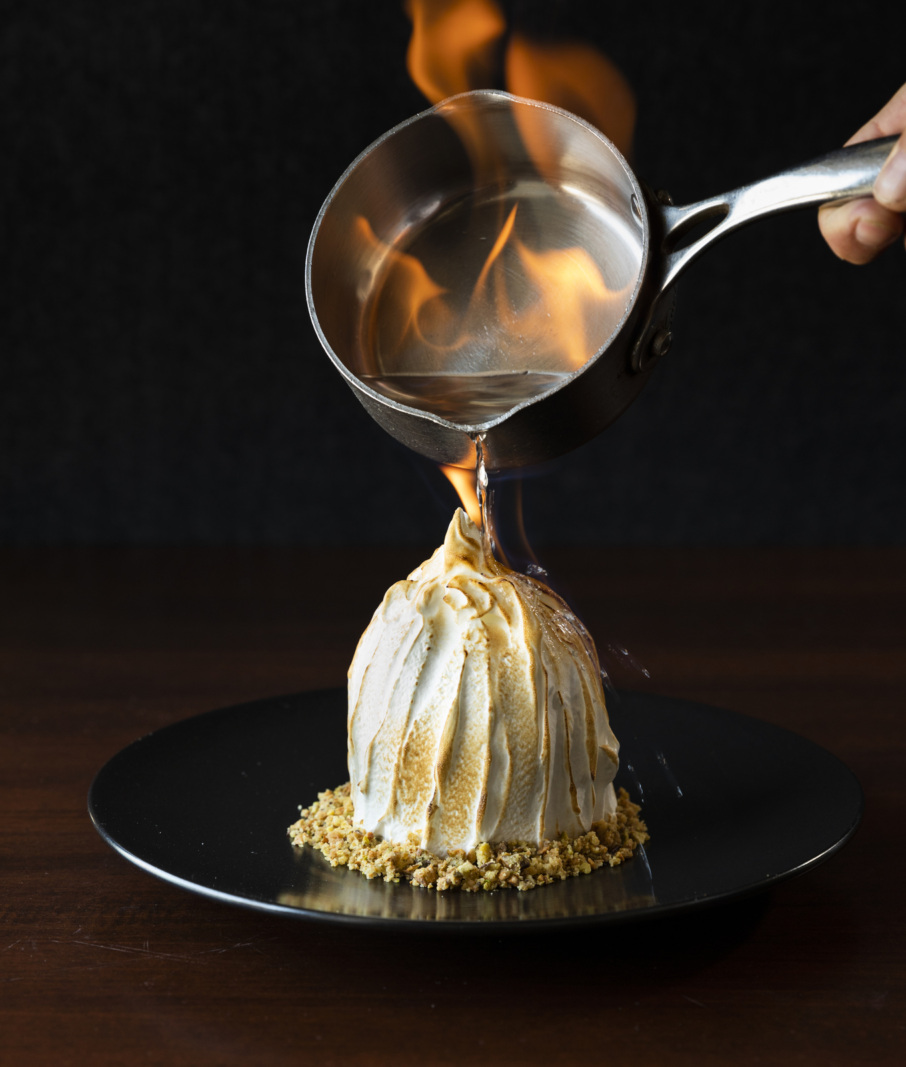
Despite the weather, why was Houston was the right place to open Bludorn?
Bludorn: Houston is a food city that has flown under the radar for a long time, up until very recently. It was this undiscovered secret, and now there’s so much excitement around it. In my trips down to Houston when Victoria and I were dating, discovering the city, I realized, “This is really amazing.” And yeah, the most unattractive part is these natural disasters that come through, and the hot summers. But the best part is that people band together and really help each other out. There’s this feeling that we’re all in this together. It was clear during COVID, too. I’ve been through natural disasters in New York, and it didn’t really feel like that.
How do you see Houston’s cuisine standing on a national stage?
Bludorn: I think it’s yet to be written. We’re writing it every day, with every new menu we do, with every new menu every other restaurant does. We can dive into the local Gulf Coast cuisine, but that again, is something that is being written all the time, and there’s different influences. It’s not just Cajun and Creole, it’s a mix of where Vietnamese influence comes into play, where Mexican influence comes into play, and how does that interact with regional ingredients or local delicacies that we love here? Whether it’s Hatch chiles or snapper or softshell crab or the local blue crab.
The day that I took over Café Boulud, I said that I want this restaurant to be better when I leave it than when I received it. And that mentality I have every day, every week, every year. I always think about, “OK, where are we now? Where do we want to be?” It’s the same with the menus and with embracing Gulf Coast cuisine. Gulf Coast cuisine has been evolving to this point, and now that we’re a part of it, we want to continue to push that forward to a national stage if we’re given the opportunity.
Mbodji: The food here is so authentic, and that is directly tied to the rich culture that Houston and the South have. This is not something that you would just find anywhere. Like Chef said, I think Houston has for a long time just flown under the radar.
Having worked for Daniel Boulud, you know what it’s like to chase Michelin stars. Can you talk about the pressures that come with that pursuit?
Mbodji: The pressure of pursuing excellence is not new to us. There’s not a time that we’re not doing that. Michelin is something that’s an incredible recognition to have, and one that comes with, obviously, the pressure to maintain. Coming to Houston, I discovered a place where my biggest motivation to do what I was doing was for our guests who come to our restaurants every day. After coming from a place where my drive was thrilled by competition, it was refreshing to find myself in a space where I was equally motivated but driven by something different.
Bludorn: I never want to have to feel like my menu has to read a certain way, or [that] I can’t have a burger on the menu. What we set out to achieve on day one was a restaurant that could do a little bit of everything. Where you could enjoy a burger and a beer at the bar watching the Astros game, or caviar and Champagne watching the same game. Or you could sit in the dining room and have a multi-course, family-style meal. We really wanted to maintain that flexibility for our guests. To us, the biggest thing that the pandemic changed was the outlook of luxury. We feel like the ultimate luxury is being able to have exactly what you want, whenever you want it.
The food here is so authentic, and that is directly tied to the rich culture that Houston and the South have. This is not something that you would just find anywhere.— Cherif Mbodji, partner in the Bludorn restaurants
Perseid will be the first Bludorn restaurant located inside a hotel. What was the allure of that?
Aaron Bludorn: We feel like our brands really are well aligned. It’s Bunkhouse’s first hotel here in Houston, and we were thrilled that they asked us to be part of it. The hotel’s mission is to be deeply rooted inside the community, and to interface with the Menil galleries — I need to be very clear that they’re not associated with each other, but it’s right across the street. It’s in the middle of Montrose and it just checks off all these boxes. The concept is fun, too, because we’re doing a French bistro through the eyes of Houston, so a Gulf Coast French Bistro.
Victoria Bludorn: They’ve tapped into a really cool history of Houston that out-of-towners are going to appreciate and grasp onto. The story they’re telling is really invigorating for the city, one that I actually hadn’t heard before. I’m excited to be a part of sharing that little bit of history.
Aaron Bludorn: Who knew that Andy Warhol was down here hanging out with Lynn Wyatt and oil barons at Gilley’s back in the day? That’s just another part of Houston that’s so amazing — the art world here is incredible, and getting to be just a little bit closer to that is so important for us.
Victoria, you grew up in the Pappas family, which has its own restaurant empire here that’s still growing. Does that give you extra insight into building a new restaurant group with these guys?
Victoria Bludorn: Absolutely. Even to this day for the past 35 years, my family — I’m one of five, and Aaron can attest to this — we talk about restaurants all the time, every facet, just because of the nature of growing up with all these different Pappas concepts. From a very young age, I would work in our main office. I was probably 13, and I would open up comment cards and file them, back when that’s how you got reviews. I worked at Pappas Burger for four years in high school. Then I chose to go to culinary school and work in restaurants. And then I did the craziest thing ever — marry a chef! I feel fortunate and humbled to have that insight because I know how diligent and deliberate they (Pappas) are with every decision they make.
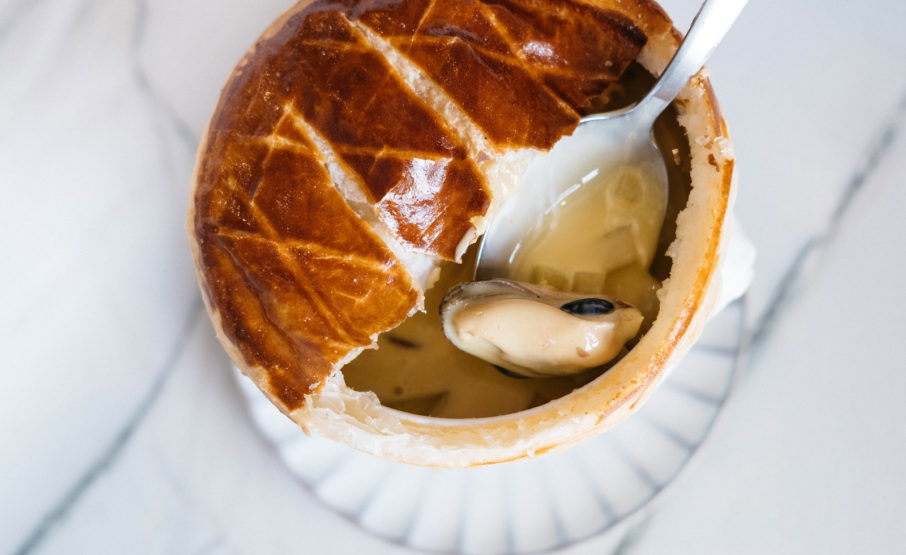
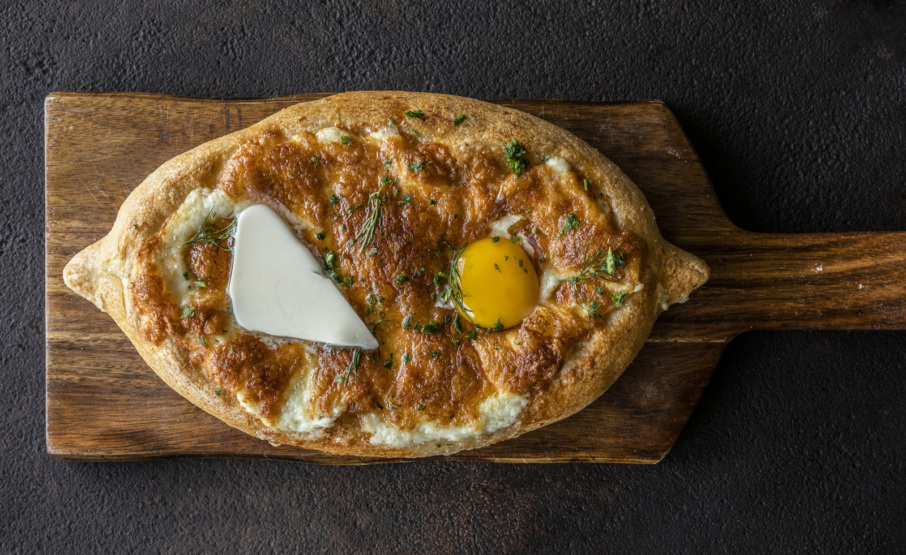
You’ve been known to do collaborations with chefs, like with Leonard Botello IV at Truth BBQ and Rafael Nasr’s Craft Pita, and very recently with Kolache Shoppe. What are the thoughts behind these partnerships?
Aaron Bludorn: It’s so much fun to collaborate with people. It’s fun for our staff, it’s fun for me, it’s fun for our guests. I think it adds excitement at a different level. That’s also why I change the menu four times a year. I want to give guests exciting new things.
Victoria Bludorn: It shows the versatility of our city, and restaurants in general, that Kolache Shoppe can work with a fine-dining restaurant, and Craft Pita counter service can come into our restaurant so seamlessly and connect with our guests.
Are there chefs you’d like to collaborate with that you haven’t yet?
Aaron Bludorn: I’ve got a list. We’re hoping to announce a dinner series soon. Brady Williams in Seattle, I would love to collaborate with. I’d love to bring a chef that’s doing Italian food in New York and do Gulf Coast products. Adam Evans is doing amazing food at Automatic Seafood in Birmingham. Danny Garcia, who’s opening up Time and Tide from the late James Kent, I’d love to bring him down. I think he’s wildly talented.
Who knew that Andy Warhol was down here hanging out with Lynn Wyatt and oil barons at Gilley’s back in the day? That’s just another part of Houston that’s so amazing.— Aaron Bludorn
What do you hope to achieve on a citywide level, and on a national level with your restaurants?
Bludorn: Citywide, we’re just looking to continue to train the next generation. Alejandra Pena is a good example. She started with us as a cook, and then became a sous chef at Bludorn, executive sous chef at Navy Blue, and then opened up Bar Bludorn as executive chef. To continue to foster talent in the city is what I’m super excited about because that’s just going to make our city’s dining scene even better. To see what they go on and do, I’ll definitely shed a tear because I’ll know that our goal of coming to the city and making a positive impact on the future will have been achieved.
On a national level, I’d love to establish Gulf Coast cuisine as one of the cultural cuisines of our country, and remind people that this is not just Creole or Cajun in New Orleans. It’s the large intersection of cultures that are here in Houston, Galveston, Beaumont even, all the way over to New Orleans and the Gulf Shores. If we can help shine that light even more on what’s happening here, our goal will be achieved on a national level.
Do you think you’ll ever expand outside of Houston?
Bludorn: It’s on the table, but no immediate plans. But yeah, our goal would be to move outside of Houston, move outside of Texas at some point. Who knows? I don’t know what the future holds, but we’re open to all of it.












